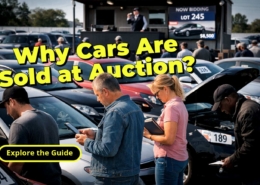 https://auction.ridesafely.com/images/2026/01/sedan-vs-suv-banner.jpg
865
1440
RideSafely
/images/2025/01/ridesafely-logo.svg
RideSafely2026-01-22 09:48:242026-01-30 12:46:22Sedan vs SUV: Which Is Better for Your Needs?
https://auction.ridesafely.com/images/2026/01/sedan-vs-suv-banner.jpg
865
1440
RideSafely
/images/2025/01/ridesafely-logo.svg
RideSafely2026-01-22 09:48:242026-01-30 12:46:22Sedan vs SUV: Which Is Better for Your Needs?Many folks feel uncomfortable when it comes to the idea of getting a vehicle from a used car auction because they are often associated with fleet management companies or large organizations that look to dump their cars quickly.
However, with rising new car pricing, more and more people are turning toward these used car auctions to find reliable and affordable cars. Just like when purchasing a car from a dealership, buying at a used car auction also requires paperwork.
The History Report
Typically, the vehicle history report will include a history of registrations for the automobile or truck you’re thinking about buying. You may also purchase a separate registration history for a fee. However, the cost will vary depending on where you get it. Paying for it to be done by a third party might provide more information than simply the state where the car is presently or most recently registered.
For a variety of reasons, information on previous accidents is an important aspect of a history report. For starters, previous accidents might have an influence on a vehicle’s value. Second, a collision might result in long-term harm to the vehicle’s general safety or functionality.
The vehicle’s maintenance history is an important aspect of the history report. This will include a list of any previous maintenance performed on the vehicle and when it was completed. Previous owners and title transfers may also be included in history reports. This information can help you avoid being a victim of fraud or purchasing a potentially risky vehicle.
Registration Certificate
The registration certificate is the first and most significant document to inspect when purchasing a secondhand automobile. This document serves as an identity verification for the vehicle and its owner; if the information on the RC matches the information on the vehicle, it is authentic. Keep a sharp watch out for a duplicate RC; always request an original and walk away if you can’t get one.
Keep a lookout for ownership facts, such as whether the last owner of the vehicle was the first or third owner. You have the option of purchasing a registered or unregistered vehicle. If the automobile you’re looking at is registered, we may further divide it into three groups. The third scenario is when the vehicle is unregistered. It’s important to note that for the transaction, you’ll need both an invoice and a sales certificate, which are two separate papers.
Bill of Sale
Considering purchasing a vehicle? The bill of sale is the most crucial document in the transaction. It’s also known as a buy and sell contract. This is the piece of paper that effectively closes the deal. You’ll need appropriate evidence of ownership whether you’re buying a vehicle, truck, trailer, snowmobile, or even an ATV.
If you don’t have it, registering the vehicle or obtaining a title certificate may be challenging. With the bill of sale, obtain proof of ownership. This form is filled out by both the vendor and the buyer. It contains information such as Vehicle identification number and year of manufacture (VIN).
Service History
As the name implies, the service book, often known as a blue book, is a historical record of the services a vehicle has received. The meter readings on each service also reveal if the car’s odometer was tampered with, which provides you an idea if the vehicle was properly maintained or not. Before making any decisions on a car, always read the blue book attentively.
Used vehicle auctions provide the typical customer with the finest opportunity to acquire a used automobile at a bargain price. It’s crucial to note, though, that the regulations governing used vehicle auctions — and who may register to bid in them – differ from state to state. In reality, in most circumstances, only individuals with a dealer’s license are permitted to attend used automobile auctions.
If you want to attend a used automobile auction in person, you may always cooperate with someone who has a dealer’s license as an intermediary. You may take part in online vehicle auctions, which allow you to browse used cars from all around the country.
It’s recommended to go to at least a few auction houses without actually purchasing anything to get an idea of the process. This will also keep you from making any expensive mistakes while purchasing a used car at an auction. Some auction houses are specific about what format of payment they accept, so be sure to check what type of credit or debit cards you can use.
Bidding is simple; simply raise your hand to put a bid on a car or the catalog, and the process will continue until there are no more bids in the room. The automobile is sold to the highest bidder, and the hammer falls. Bidding is frequently fast-paced, so keep track of the pricing and the number of individuals bidding on the automobile.
Vehicles Not Eligible for Export
Vehicles having simply a title or Bill of Sale stamped with lien or certificate of destruction are not allowed to be exported.
Automobiles with a Washington Bill of Sale and vehicles with Florida Certificates of Destruction, on the other hand, can be exported. Additional documentation is necessary for those, and it is also recommended to contact a shipping provider for more details.
Any of those title kinds can be exported domestically without issue, but keep in mind that cars identified as parts only/junk/scrap or any other non-repairable classification are not allowed to be registered in the United States. Those cars can be used for components, but registration is difficult, if not impossible.
Other Important Documents
However, after you’ve acquired a vehicle through an online auction, that’s not the only proof of ownership you’ll need. If you live in New York State, for example, you’ll also need a New York State Certificate of Title, otherwise, the vehicle’s ownership will not be transferred to your name.
The buyer and seller’s signatures will appear on the title. It also includes other vital details about the car, such as the date of sale (as stated on the documentation) and the mileage. If the car you bought at the online auction is older than ten years, you’ll also require an Odometer Disclosure Statement.
This information should be included on the back of the title certificate and will verify that the vehicle’s odometer reading is accurate and verified. A Damage Disclosure Statement verifies that the car has been in an accident or has been damaged in the past. For any cars manufactured in 1976 or after, you might also need a California Smog Certificate if you are in California.
There are auto auctions happening almost every week around the country, but not all used car auctions are equal. RideSafely.com offers potential customers a safe and reliable platform where they can find affordable vehicles that fit their budget.
The website is also home to the largest used car auction inventory, making it easier for you to find the perfect car for your specific needs. You also get to take advantage of a plethora of information on used vehicles and auto auctions that the website has to offer which takes the guesswork out of the used car buying process.



 Why Cars Are Sold at Auction – Car Auction Guide
Why Cars Are Sold at Auction – Car Auction Guide

Leave a Reply
Want to join the discussion?Feel free to contribute!